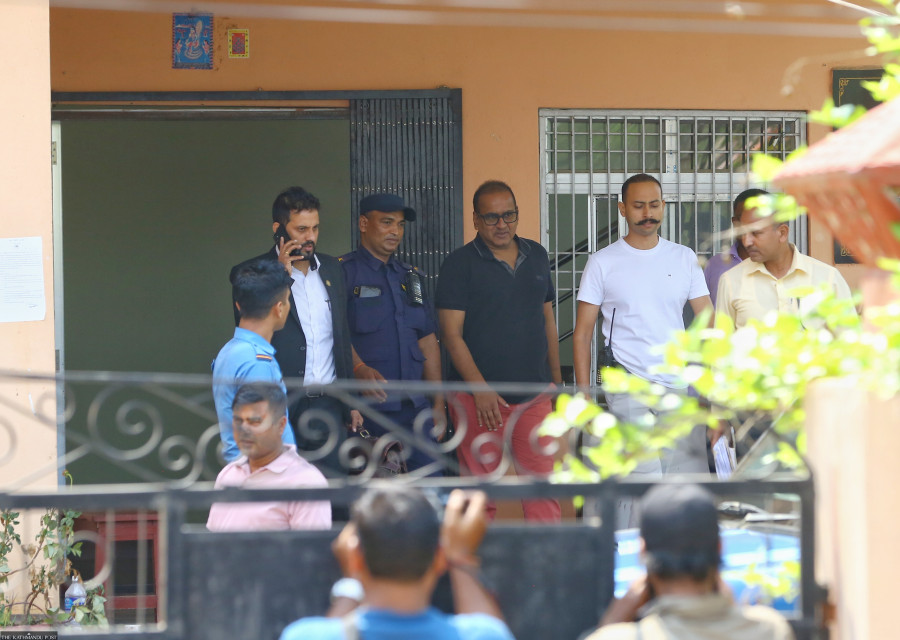National
Kailash Sirohiya’s case is an outcome of administrative flaws, experts say
Many allegations levelled against Kantipur Media Group chairman don’t need jail even when proven, they argue.
Post Report
On Tuesday, Nepal Police, based on the warrant from the Dhanusha District Court, arrested Kantipur Media Group Chairman Kailash Sirohiya to investigate a case related to his citizenship certificate.
Armed police personnel arrested Sirohiya from his Thapathali-based office and subsequently took to Dhanusha, where a complaint was filed against him. The district attorney's office has levelled six allegations against him. Sirohiya has furnished point-wise clarification against the allegations.
The legal experts who have closely followed the matter say the allegations are purely related to administrative flaws, which do not amount to criminal offences. "How can an individual be prosecuted for mistakes committed at the administrative level?" said senior advocate Dinesh Tripathi. "This prima facie is an act with mala fide intention."
The Citizenship Act lists several offences that are criminal and others resulting from administrative flaws. As per Rule 21 of the Act, the criminal offences are subject to jail terms or fines and both but there is no such penalty for the other offence. "No allegations against Sirohiya are liable to jail term," said Tripathi.
As per the charges, Sirohiya obtained a citizenship certificate numbered 39698886 from the District Administration Office, Dhanusha, but it was found that the citizenship certificate with the same number had already been issued to Shivaji Sah Teli as well.
A question has also been raised why only Kailash Prasad Sirohiya got the citizenship by descent while his siblings have naturalised citizenship. The lack of exact date of birth, absence of signature in the record books and missing of documents mandatory to obtain the citizenship are the allegations against him.
Legal experts say all the allegations relate to administrative flaws in which Sirohiya has no role.
Offences relating to citizenship are serious when a non-Nepali obtains the certificates producing fake documents. In the case of Sirohiya, his father himself is a Nepali citizen who was a prominent businessman in Janakpur, said Tripathi.
"The allegations against Sirohiya themselves clarify the rumours that he has multiple citizenships," said Tripathi, who also chairs the Constitutional Lawyers' Forum. "It is ironic that the home minister, who had dual citizenship and passport, is witch-hunting a person just because his wrongdoings were published in the newspaper."
If the legal experts’ claim is anything to go by, the arrest should be the last resort but it has been treated by the state authorities as normal.
The arrest is necessary when an accused can tamper with evidence or abscond.
"Both situations do not apply to Sirohiya’s case," advocate Raju Prasad Chapagain told the Post.
In the case of Sirohiya, there was no possibility that he would tamper with the evidence. For this reason, he need not be taken into custody, thereby cutting his access. Similarly, his roots are Nepali. He has social, family and business relations in Nepal and is held in high repute in the Nepali society. There is no chance he would not cooperate with the investigation.
Sirohiya himself has said he would have appeared before the authorities to record his statement. But he was arrested without being summoned for interrogation.
"This arrest has raised questions over the intention of the investigating authority. People will lose trust in the investigation system if this continues," said Chapagain. "The investigating authorities cannot be dictated by the political leadership."
Chapagain added that Sirohiya’s arrest is a clear case of revenge by Rabi Lamichhane, the deputy prime minister and minister for home affairs, because the Kantipur Media Group exposed several of his wrongdoings—from holding passports of two countries to embezzling millions of rupees from the cooperatives.




 18.12°C Kathmandu
18.12°C Kathmandu













